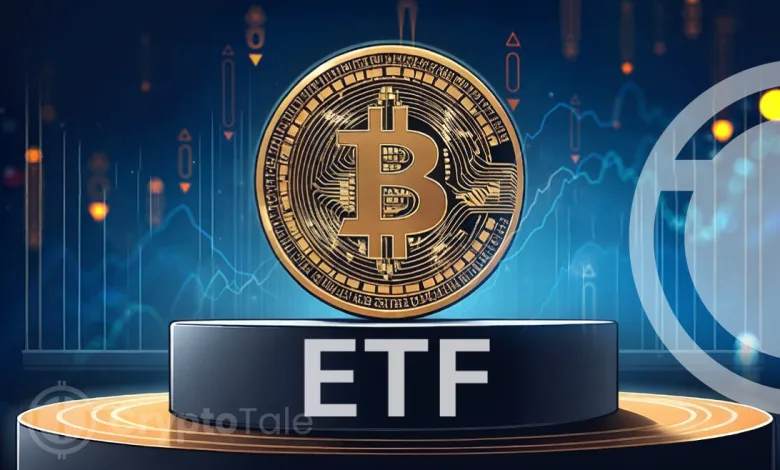How To Purchase Spot Bitcoin ETFs? Its Pros and Cons

From the beginning, traders were looking for a simple way to invest in Bitcoin as they considered investing directly in BTC is risky. The SEC approval for spot Bitcoin ETF has paved the way for investors and traders to diversify their portfolios. Before the approval of spot Bitcoin ETFs on January 10, 2024, the markets were open for trading Bitcoin Futures ETFs. Bitcoin Futures ETF is where future Bitcoin contracts are sold to investors. Here, you can get to know about the funds that offer ETFs and how to buy Bitcoin ETFs.
What Is a Bitcoin ETF?
An exchange-traded fund (ETF) is a fund containing a multitude of assets whose shares are traded like stocks on the exchange. It is a kind of security combining the advantages of stocks, bonds, and mutual funds. This allows investors to trade ETFs throughout the day at different prices. ETFs have a lower cost and are tax-efficient when compared with other type of investments.
Bitcoin ETF is a fund solely focused on the assets related to Bitcoin. The firm uses the funds from the investors who bought the ETF shares to buy bitcoins directly. Investment firms manage the Bitcoin ETF; unlike mutual funds, it is traded on the stock exchange.
Bitcoin Spot ETF is a good investment vehicle for investors seeking to gain exposure to the crypto world. You can easily invest in ETFs through a brokerage account. The risks associated with investing in ETF are lower when compared with investing in Bitcoin. It benefits investors by allowing them to gain exposure to the price movements of Bitcoin without any hassle.
How Does Bitcoin ETF Work?
Bitcoin ETF functions similarly to any other ETF, where the asset management company buys Bitcoin ETFs and issues shares. When investors buy these shares, they gain access to the fund where Bitcoin ETF is stored as an asset.
ETFs can be bought and sold on a traditional stock exchange. This eliminates the various complexities investors need to go through. However, investors need to pay an annual fund management fee to the institute managing the fund.
When an investor buys a share of Bitcoin ETF, the institute releases new shares. When large amounts of ETF shares are released, they are redeemed to maintain the number of shares in circulation.
What Is the Difference Between Investing in a Bitcoin ETF and Bitcoin?
One of the major differences between Bitcoin ETF and Bitcoin is the need for cryptocurrency exchange. Bitcoin ETF can be traded through a traditional brokerage account.
Unlike Bitcoin, where there is little regulatory oversight, Bitcoin ETF is regulated by the SEC. This makes Bitcoin ETF less volatile while offering a familiar environment to new investors.
Although Bitcoin is a widely recognized and commonly used cryptocurrency within trading circles, it’s important to acknowledge the inherent volatility and potential risks associated with this investment approach. Investing in Bitcoin ETF is considered a portfolio approach, meaning investors can participate in the potential appreciation of Bitcoin while having a diversified investment strategy. Investing solely in Bitcoin can be a risky move because single-asset exposure can often result in losses.
As Bitcoin ETFs are traded in shares, they are bought and sold during the trading day. However, the market for Bitcoin will be open for a long time. Spot Bitcoin ETFs are professionally managed by the firms creating the ETF shares. The firms will create or redeem the shares when the trading is below or above its net asset value and the cost of the underlying Bitcoin.
Where Can You Buy Bitcoin ETFs?
The approval of spot Bitcoin ETF enabled investors to buy ETF shares via major fund managers. It will be listed on exchanges like the New York Stock Exchange (NYSE), Nasdaq, and Chicago Board Options Exchange (CBOE). The fund managers who are offering Bitcoin ETF shares include:
| ETF | Ticker | Exchange | Expense Ratio | Waiver Period/Asset limit |
| ARK 21Shares Bitcoin ETF | ARKB | Cboe BZX | 0.0% (0.21%)* | Six months or $1 billion in assets |
| Bitwise Bitcoin ETF | BITB | NYSE Area | 0.0% (0.20%)* | Six months or $1 billion in assets |
| iShares Bitcoin Trust | IBIT | Nasdaq | 0.12% (0.25%)* | 12 months or $5 billion in assets |
| Fidelity Wise Origin Bitcoin Fund | FBTC | Cboe BZX | 0.0% (0.25%)* | Until July 31, 2024 |
| VanEck Bitcoin Trust | HODL | Cboe BZX | 0.25% | N/A |
| Grayscale Bitcoin Trust | GBTC | NYSE Area | 1.50% | N/A |
| Franklin Bitcoin ETF | EZBC | Cboe BZX | 0.29% | N/A |
| Hashdex Bitcoin ETF | DEFI | NYSE Area | 0.94% | N/A |
| Invesco Galaxy Bitcoin ETF | BTCO | Cboe BZX | 0.0% (0.39%)* | Six months or $5 billion in assets |
| WisdomTree Bitcoin Fund | BTCW | Cboe BZX | 0.0% (0.30%)* | Six months or $5 billion in assets |
| Valkyrie Bitcoin Fund | BRRR | Nasdaq | 0.0% (0.49%)* | Three months |
Note: * represents real price after Waiver period/Asset limit
What Are the Ways To Buy Bitcoin ETFs?
Investors have many ways to buy Bitcoin ETF shares, and they are:
Online Brokerage Accounts:
Investors can buy Bitcoin ETF shares by opening a brokerage account on Robinhood, Charles Schwab, or other brokerage firms. Brokerages have a search window where investors can search for the ETF they want to invest by using the ticker or name of the fund.
Financial Advisers:
Financial advisers can help guide investors through the process of investing in Bitcoin ETFs. Based on surveys conducted by Bitwise, more than 19% of financial advisors have shown interest in ETFs and are likely to include them in their client’s accounts.
ETF Issuers:
Investors can go directly to the Bitcoin ETF issuer portal to buy the ETF. However, traders need to have a brokerage account with brokerages the issuer works with. For instance, investors seeking to buy GBTC shares must have a brokerage account with one of its issuers.
Crypto Exchanges:
With the developments in the regulatory landscape, crypto exchanges are planning on providing investors with an avenue for making profits by launching ETFs. Major crypto exchanges like Coinbase and Kraken are expected to launch Bitcoin ETF service within 2024. Furthermore, Coinbase has become a major player in the ETF ecosystem by acting as a custodian for eight ETF-approved funds.
How To Buy Bitcoin ETFs?
The most common way to buy Bitcoin ETFs is through a brokerage account. Here are the steps that investors need to follow to purchase the ETF:
Create a Brokerage Account:
First, find out which brokerages support Bitcoin ETFs, compare the benefits various brokerages offer, and choose the one that fits your needs. Brokerages that support Bitcoin ETFs include Charles Schwab, Vanguard, and others. Install the brokerage service application on your device or use the official portal to sign up.
Finance the Account:
The fund created will be devoid of any funds. So the first step after creating an account is to fund the account. There are many options available to fund the account:
- Electronic funds transfer from your savings or checking account
- Wire transfer
- Cheques through mail
Inspect All Bitcoin ETFs:
Before investing in Bitcoin ETFs, conduct thorough research on aspects like expense ratio, tracking strategy, and issuer of the ETF. In finance, overlooking a small detail might result in a lesser return on investment or worse.
Choose Your Preferred Bitcoin ETF & Order the ETF:
After doing an in-depth analysis:
- Choose the Bitcoin ETF that aligns with your investment goals.
- On the brokerage platform, enter the ticker symbol in the required field. Specify the number of shares you wish to buy, set the stop order, and other necessary details.
- Before submitting the order, review all the details and ensure they are accurate. Once the order is confirmed, the brokerage will execute the order.
Monitor Investments Regularly:
Make sure to keep an eye on your investment, as market trends can change significantly in a short period of time. Use your brokerage account to monitor the investment performance.
What Are the Pros and Cons of Bitcoin ETFs?
Bitcoin ETFs allow investors to leverage the price of Bitcoin without the need to learn the inner workings of BTC. Investing in ETF does not require setting up an account on crypto exchanges, eliminating the need to remember wallet passwords.
The biggest advantage that investors get by investing in ETFs is diversification. A single Bitcoin ETF share could comprise stocks from different companies along with the Bitcoin stock, thereby limiting risks and diversifying the portfolio. Since Bitcoin ETFs are traded like stocks on traditional exchanges and are regulated by the SEC, they are eligible for tax efficiency.
Investors who invest heavily in Bitcoin ETFs will likely pay a large sum as management fees. Owing to the heavy competition, many ETF issuers strategically lowered their fee to attract potential investors.
Although Bitcoin ETF’s underlying asset is Bitcoin, because of diversification, it also has holdings of other assets. This hinders the ETF from accurately reflecting the price of Bitcoin. For instance, when the price of Bitcoin increases by 20%, the Bitcoin ETF might not reflect the true value of its holding.
Bitcoin, the revolutionary cryptocurrency, can be traded or swapped with other digital assets like ETH, Ripple, etc… However, this is not possible using Bitcoin ETF because it is an investment fund.
Final Points
Spot Bitcoin ETF has offered an avenue of investment opportunities for investors and traders to diversify their portfolios. The approval for 11 spot Bitcoin ETFs on January 10 by the SEC has sparked discussions amongst crypto enthusiasts about its risks. However, it could increase market liquidity, which could result in more stable prices and easier price discovery.





